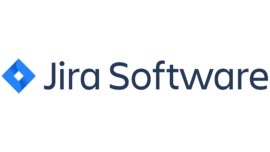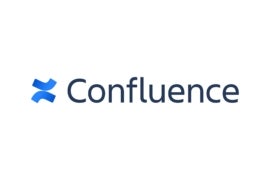-
Fieldwire: Overall best for construction project management
-
Jira: Best for task tracking
-
Confluence: Best for collaboration
-
Buildertrend: Best for remodelers
-
Contractor Foreman: Best for contractors and ease of use
-
Procore: Best for technical support
-
Houzz Pro: Best for lead generation
Handling a construction project is complex, especially for project managers who have to juggle everything including materials, employees, client expectations and project deadlines. Construction project managers need an efficient way to manage their resources and coordinate all of the tasks associated with their projects. For many teams, the best way to consolidate all of their project plans and increase visibility into individual tasks is to invest in project management software.
SEE: Hiring kit: Project manager (TechRepublic Premium)
Construction project management software helps contractors and subcontractors streamline the process of completing projects on time and within budget. It provides a centralized platform to keep track of tasks, communicate with project teams and stakeholders, store documents and files, and generate reports. The software also offers collaboration capabilities that keep stakeholders connected throughout the project life cycle.
In this product guide, we’ve evaluated seven of the best construction project management software solutions, taking a closer look at their features, costs, pros and cons, to help you determine the best option for your needs and budget.
Jump to:
- Best construction project management software: Comparison table
- How to choose construction project management software
- FAQs about construction project management software
- Methodology
Best construction project management software: Comparison table
| Starting price | Scheduling | RFIs capabilities | Mobile app | Client portal | |
|---|---|---|---|---|---|
| Fieldwire | $0 for smaller teams | Yes | Yes | Yes | No |
| Jira | $0 for smaller teams | Yes | No | Yes | Yes |
| Confluence | $0 for smaller teams | Yes | No | Yes | Yes |
| Buildertrend | $99 per month | Yes | Yes | Yes | Yes |
| Contractor Foreman | $49 per month | Yes | Yes | Yes | Yes |
| Procore | Contact sales team for pricing | Yes | Yes | Yes | No |
| Houzz Pro | $65 per month | Yes | No | Yes | Yes |
Fieldwire: Overall best for construction project management

Fieldwire is purpose-built construction project management software that is designed for general contractors, specialty contractors, owners, architects and designers. It offers functionality to help them plan, manage and track construction-specific projects from start to finish, providing the necessary features for successful project delivery.
Fieldwire lets users connect with their teams in real time while managing project tasks, documents and photos. Fieldwire capabilities also include task management, checklists, punch lists, inspections and reports.
Pricing plans
Fieldwire offers tiered pricing plans, priced depending on your needs and preferences:
- Basic: This is a free plan with a limit of five users and three projects.
- Pro: $39 per user per month billed annually, or $54 per user per month billed monthly.
- Business: $59 per user per month billed annually, or $74 per user per month billed monthly.
- Enterprise: This is a quote-based plan. Contact the Fieldwire sales team for custom quotes.
Standout features
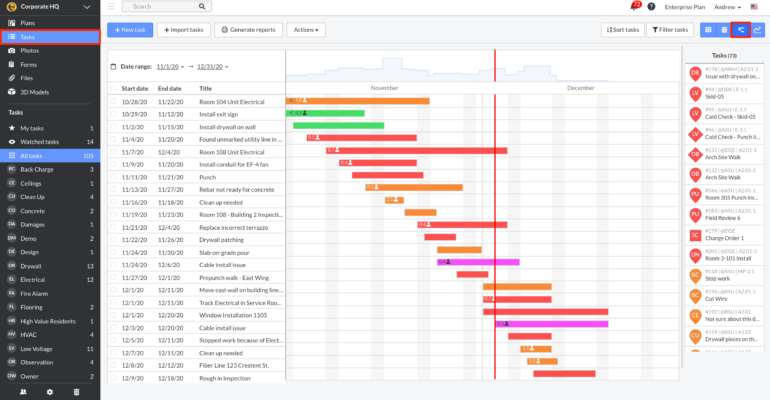
- Supports real-time communication amongst teams for accelerated decision-making.
- Team performance tracking to ensure timely task delivery.
- Allows users to manage upcoming items with customizable PDF reports that can be scheduled.
- All-inclusive features for various types of contractors, including concrete, electrical, plumbing, HVAC, interior finishing and fire-stopping contractors.
- Platform support for 18 languages; the customer support team is fluent in English, French, Spanish, Portuguese, German, Czech and Italian.
- Supports kanban boards, Gantt charts and calendar views.
Pros
- Transparent pricing.
- Offers a free plan for budget-conscious users.
- Supports file sharing and plan viewing.
- Multi-device support for Web, Android and iOS.
- Real-time push notifications.
- Custom form creation.
Cons
- Basic and pro plans lack phone support.
- Application programming integration access and single sign-on features are only present in the enterprise plan.
Jira: Best for task tracking
Jira is an issue-tracking and project management tool for teams of one to 20,000+ users. It’s versatile software with various features and customizable templates that allow users to create their own workflows. With features such as project roadmaps, team collaboration, time tracking, budgeting, document management and analytics reports, Jira ensures teams remain on track throughout the project life cycle.
Although Jira is not specifically designed for construction teams, it offers many features that are helpful for this kind of work. For example, Jira’s hierarchical and Gantt chart elements are ideal for managing more granular and even unplanned administrative project tasks that may arise, such as filing change orders.
In addition, Jira’s Gantt charts come with smart resource risk management add-ons, which can be useful for managing and reallocating project resources when unexpected variables like weather impact project outcomes and schedules.
Pricing plans
Jira’s pricing plans are as follows:
- Free: $0 for up to 10 users.
- Standard: $7.75 per user per month.
- Premium: $15.25 per user per month.
- Enterprise: This plan is quote-based.
Standout features
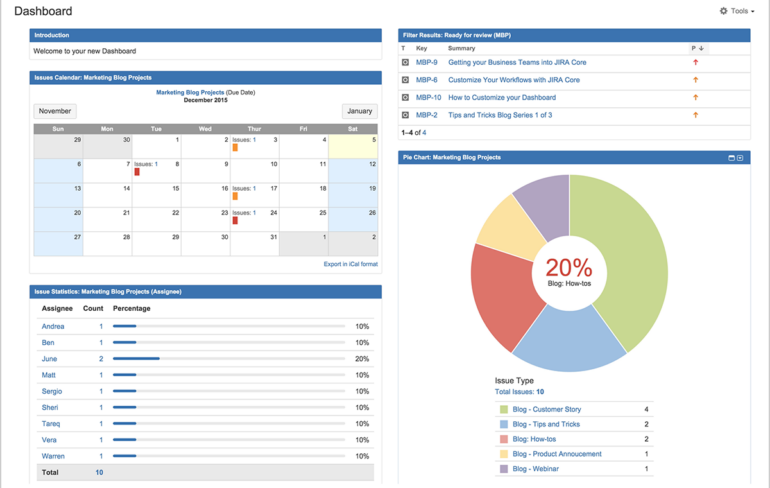
- Integrates with other Atlassian and third-party tools, such as Dropbox, Slack and Microsoft Teams.
- Reports and insights capabilities.
- Customizable workflows.
- Workflow management with scrum and kanban boards.
- Project roadmap capability enables users to define their project goal and vision.
Pros
- Integrates with over 3,000 apps.
- Drag-and-drop automation.
- Easy to use and highly customizable.
Cons
- Complex initial setup process.
- Primarily built for engineering and software development teams.
Confluence: Best for collaboration
Confluence is team collaboration software that helps teams to organize and share information, collaborate, plan, and track projects in one centralized location. It can be used for various project management needs, including task management, resource management, project timelines and project reporting. It is used by both small and large teams and can be customized to fit their differing needs.
Like Jira, Confluence isn’t specifically designed for construction projects, but it’s especially great for construction companies with offices and remote workforces that are spread out geographically. The platform allows administrators to create collaborative knowledge hubs for sharing the most up-to-date company and team news, not to mention the project spaces and searchable labels users can add to their accounts.
So, whether it’s a worker on a construction site or a back-office team member who manages payroll in another country, each team member can view the company’s feed and find answers to their questions on their own time.
Pricing plans
Confluence offers one free plan and three paid plans:
- Free: $0 for up to 10 users.
- Standard: $5.75 per user per month.
- Premium: $11 per user per month.
- Enterprise: This plan is quote-based.
Standout features
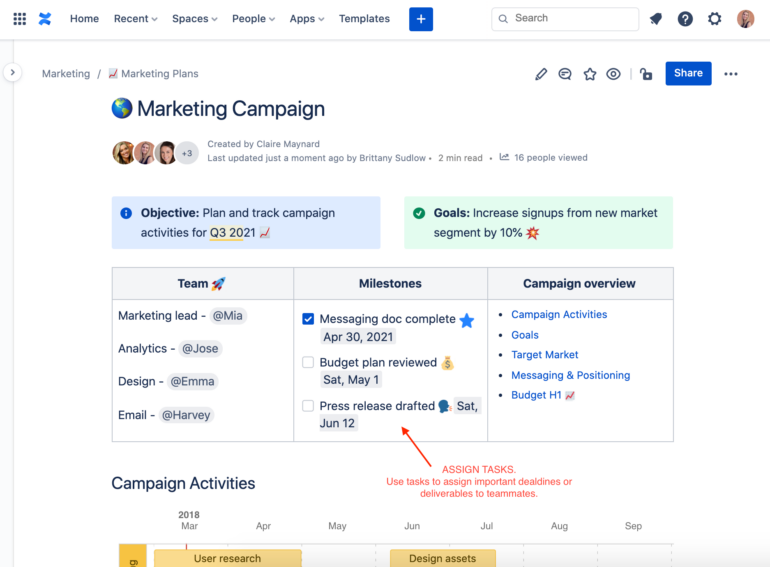
- Integrates with Atlassian software and other third-party tools such as Jira, Trello, Figma, Slack, Dropbox, Box, Google Drive and Microsoft Teams.
- Includes various project management templates, including end-of-week status reports and Atlassian project plans.
- Marketing campaign templates for planning and tracking marketing tasks and deadlines.
- 99.9% and 99.95% uptime service-level agreements available in Premium and Enterprise tier plans, respectively.
Pros
- Free plan available.
- Mobile app for iOS and Android.
- Designed for optimized team collaboration.
Cons
- Free and Standard plans have limited support.
- Can be expensive for organizations with large numbers of users.
Buildertrend: Best for remodelers
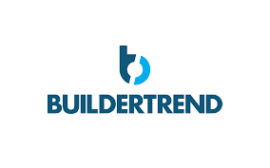
Buildertrend is a cloud-based construction project management software designed for home builders, specialty contractors, remodelers and commercial contractors. They can use this software to schedule tasks, track progress, manage budgets, keep documents organized and access job site information.
Buildertrend’s software integrates with many popular business apps, such as Quickbooks, Xero and Gusto for payroll and accounting services. It also integrates with the Home Depot Pro Xtra program for purchasing needs. Beyond its integrations and primary feature set, Buildertrend offers a customer portal that allows clients and subcontractors to collaborate on and discuss project progress in real time.
Pricing plans
Buildertrend offers three pricing plans. Rates depend on the selected package:
- Essential: $99 per month billed annually, or $399 per month billed monthly.
- Advanced: $399 per month billed annually, or $599 per month billed monthly.
- Complete: $899 per month billed annually, or $1,099 per month billed monthly.
The above rates are for the first two months of use. Rates for monthly plans then increase to $399 for Essential, $699 for Advanced and $1,299 for Complete.
Standout features
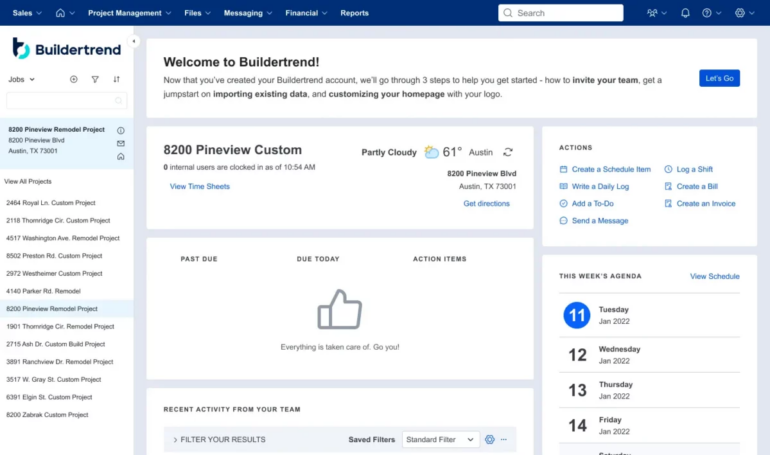
- Advanced estimate and bid management.
- Users can create requests for information and add photos or documents to the platform.
- Integrates with various third-party tools, including Quickbooks, Xero and Gusto.
- Lead management and proposal capabilities.
- Time clock features enable teams to clock in and out on their phones.
- Invoice creation based on estimates.
- File annotation capabilities.
Pros
- Transparent pricing.
- Automates email campaigns and tracks lead responses.
- Offers a customer portal.
- Bills management.
- A+ rating from Better Business Bureau.
Cons
- Steep learning curve.
- Lacks a free trial option.
Contractor Foreman: Best for contractors and ease of use

Contractor Foreman is an easy-to-use, cloud-based construction project management software that helps contractors and subcontractors manage their entire project life cycle, from estimating and bidding to project scheduling and job costing.
The tool is intuitive and user-friendly, allowing users to manage projects efficiently. Contractor Foreman offers a 30-day free trial and flat monthly subscription options for a limited number of users. Although Contractor Foreman offers four pricing plans, the lower tier plans include the core features most teams will need to manage their projects.
Pricing plans
Unlike other construction project management solutions, which charge on a per-user basis, Contractor Foreman offers a flat monthly rate for its packages:
- Standard: $49 per month billed annually.
- Plus: $87 per month billed annually, or $133 per month billed quarterly.
- Pro: $123 per month billed annually, or $189 per month billed quarterly.
- Unlimited: $148 per month billed annually, or $228 per month billed quarterly.
Standout features
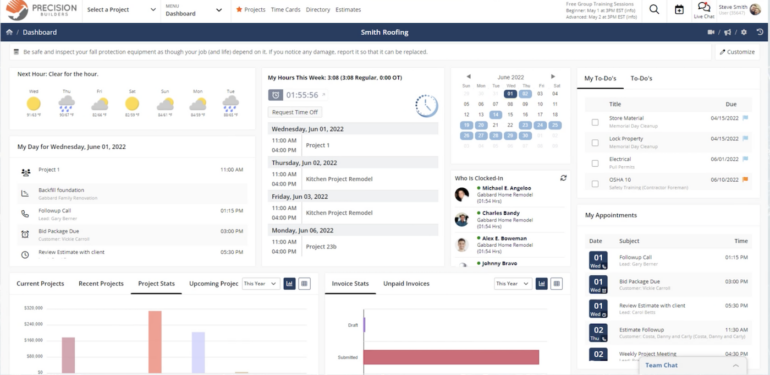
- Integrates with several third-party solutions, including Angi Leads, CompanyCam, Google Calendar, Gusto, Outlook 365 Calendar, QuickBooks Desktop, QuickBooks Online, SweetPay, WePay by Chase and Zapier.
- Users can run an unlimited number of projects.
- Daily logs of complete project records, weather tracking, and material and equipment used.
- Electronic approvals and signatures.
- Supports Gantt charts.
Pros
- A 30-day free trial is available.
- 100-day money back guarantee.
- Easy-to-use and intuitive user interface.
- Flat monthly fee.
Cons
- Standard plan lacks client portals.
- Somewhat limited integrations.
Procore: Best for technical support
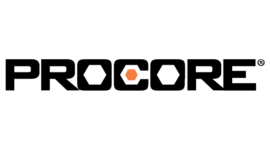
Procore is cloud-based construction project management software for general contractors, specialty contractors, subcontractors, owners and developers, and government agencies. Construction professionals can use the tool to manage projects from pre-construction through closeout, including document management, budgeting, scheduling, RFIs, submittals, quality and safety, field productivity management, and collaboration.
Pricing plans
Procore doesn’t advertise rates on its website. Potential buyers should contact the Procore sales team for pricing information.
Standard features
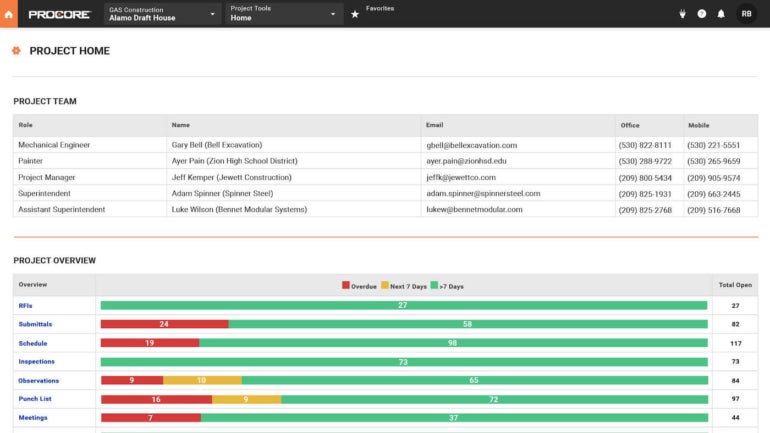
- Integrates with over 400 applications, including DocuSign, Criterion HCM, 360 Sync, AkitaBox and Hiboo.
- Provides real-time visibility into project financial health.
- Intelligent specification management.
- Unlimited storage.
Pros
- 24/7 customer support.
- Mobile app available for iOS and Android.
- Active community forum with over 40,000 members.
Cons
- Lacks transparent pricing.
- Limited scalability.
Houzz Pro: Best for lead generation

Houzz Pro is a business platform for industry professionals, including home remodelers, interior designers, architects, landscape professionals and other building professionals. It connects professionals with customers, provides marketing and networking tools, and offers insights into the home improvement industry. It also offers resources for business growth, including advertising, lead management and analytics.
Pricing plans
Houzz Pro offers three pricing plans:
- Starter: $65 per month for one user; additional users cost $40 per user per month.
- Essential: $99 per month for two users; additional users cost $40 per user per month.
- Ultimate: $399 per month.
Standout features
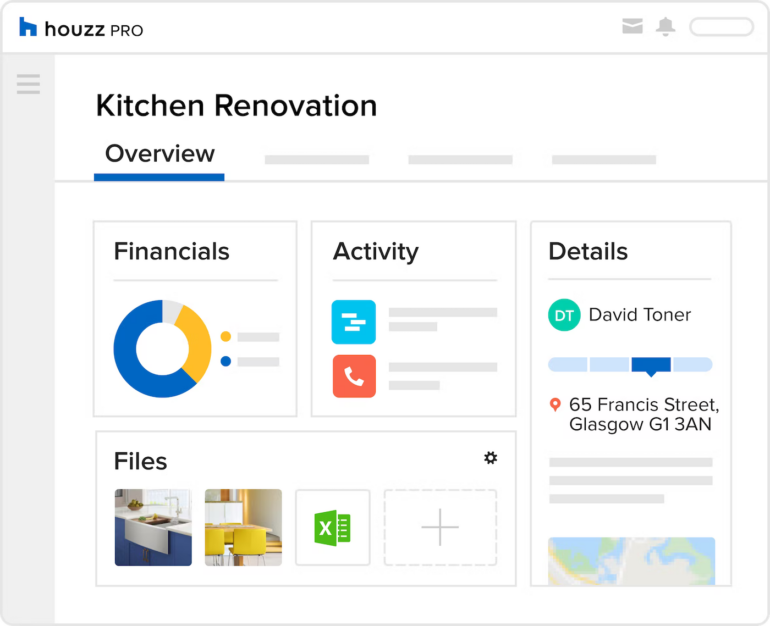
- Lead generation program.
- Offers various marketing solutions for email marketing, custom website development and targeted advertising.
- 3D floor planner.
- Integrated customer relationship management capabilities.
- Time tracking capabilities.
Pros
- A 30-day free trial is available.
- Mobile app for iOS and Android.
- Integrates with Intuit Quickbooks.
Cons
- Limited support for lower-tier plans.
- Can get expensive quickly.
How to choose construction project management software
When selecting a construction project management software solution, consider your needs, goals and budget. You want a tool that will meet your requirements and make the management process more efficient, all while staying within budget and providing visibility at all stages of the construction project life cycle.
SEE: The best mind mapping software (TechRepublic)
Consider the following tips while evaluating prospective construction project management software options:
Determine your project scope
Determining your project scope means deciding how many people need to be involved, how many tasks need to be completed and how much of the work can be done in-house. Knowing these details will help you narrow down the type of construction project management software that best fits your needs.
Research various solutions and compare features
Look for tools that offer the features you need for a reasonable price. Pay attention to whether the software has comprehensive task tracking and management capabilities as well as project cost estimation and time tracking functions.
Consider user experience
How user-friendly is the software you’re evaluating? Does it have an intuitive design with a straightforward interface? Will team members require extensive training to be able to use the software? The easier it is to use, the more likely your team will be to adopt the tool and use it correctly to increase project productivity.
Look for relevant integrations
Ensure the software you choose integrates with other tools your business uses most often, such as accounting, payroll and scheduling systems. Finding these integration opportunities now will save you time and effort when transferring data between different applications.
FAQs about construction project management software
In this section, we’ve answered some of the most commonly asked questions about construction project management software to help you determine the best solution for your needs.
What is construction project management software?
Construction project management software is a suite of tools designed to help streamline the planning, execution and delivery of construction projects. It allows users to create, track and manage tasks; collaborate with team members; measure progress; and ensure deadlines are met. Many of these tools also offer ways to quote and manage project budgets, manage and allocate project resources, and collaborate with client stakeholders.
What are the benefits of using construction project management software?
Some of the benefits of using project management software for construction projects include increased efficiency, improved collaboration, better project management, cost savings and timely project delivery. Perhaps most importantly, this kind of software provides unified visibility into all project tasks and moving parts, giving the project manager another way to effectively oversee project performance.
How do I choose the best construction project management software for my needs?
The best tool for you depends on the size of your project and the features you require to manage the project. Consider the types of tasks that need to be managed, the number of team members involved and the budget you’re working with.
How much does construction project management software cost?
Prices for construction project management software vary depending on the features, number of users and level of support needed. Many solutions offer free or trial versions. For solutions with no free options, fees start at around $10 per month for basic plans and range up to several hundred dollars per month for more comprehensive packages.
Methodology
To determine the best construction project management software for 2023, we evaluated over 20 solutions from leading providers. We compared the features, capabilities and pricing of each product and then narrowed down our list to the top seven solutions. Our evaluation criteria for construction project management included the following:
- Usability: We assessed how user-friendly each construction project management solution is. This included assessing how easy it is to set up and manage projects, assign tasks, view project reports, and collaborate with team members.
- Functionality: We reviewed the features offered by each solution, including project planning and scheduling, resource management, project tracking, collaboration tools, and reporting capabilities.
- Customer support: We evaluated each platform’s customer support system and how helpful they are in resolving issues. We also reviewed data from third-party review websites and business rating platforms such as the Better Business Bureau.
- Costs: Our review considered solutions that are best for budget-conscious companies as well as solutions for companies that are ready to invest more money for more features. We looked at what kind of payment plans and pricing options were available for each solution.
- Security: We looked at the security measures taken by each system, searching for each platform’s encryption, authentication and data storage capabilities.
- Analytics: We examined what analytics and insights each construction project management solution provides for metrics like resource allocation, task duration and project milestones.
- Customizability: Good construction project management software should be flexible enough for customization according to different business needs and processes. We examined each solution’s customizability options, such as the ability to create custom fields or integrate with third-party tools for smoother project workflows.
- Reporting and collaboration: To ensure teams stay on track, effective reporting and collaboration features are necessary. The best construction project management software solutions listed here were evaluated based on their abilities to provide useful insights while allowing teams to work together efficiently across departments and locations.
- Scalability and integration: We reviewed each solution’s ability to integrate seamlessly with other programs and platforms. In addition, we assessed each platform’s scalability — whether it can scale up or down based on changing company needs.
With these criteria in mind, we determined the seven best construction project management software solutions of 2023. Each tool has its own strengths and weaknesses, but all offer quality services for managing the ins and outs of construction projects.
Read next: The 10 best project management software and tools (TechRepublic)


